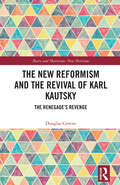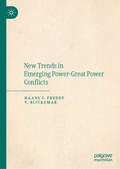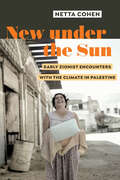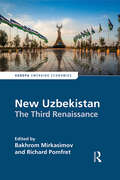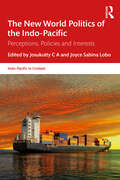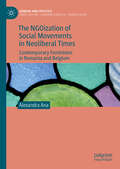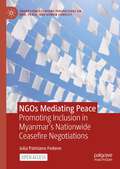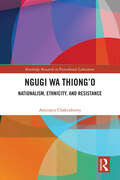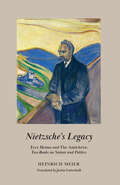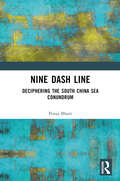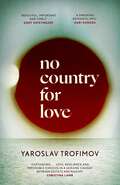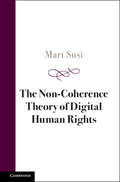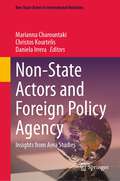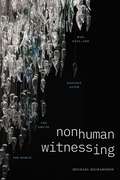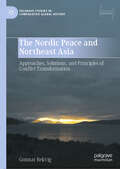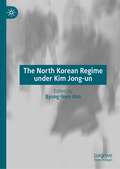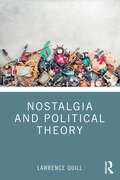- Table View
- List View
The New Reformism and the Revival of Karl Kautsky: The Renegade’s Revenge (Marx and Marxisms)
by Douglas GreeneThis text offers an authoritative historiography of German socialist theorist Karl Kautsky and his impact on debates about the Russian Revolution and the contemporary left. Known as the “Pope of Marxism,” Douglas Greene examines the totality of Kautsky’s political career and dissects the fundamental opportunism and passive radicalism that defined his Marxism. He later examines the most substantive Marxist critics of Kautsky, namely Rosa Luxemburg, V. I. Lenin, and Leon Trotsky, while offering a critical assessment of the work produced by scholars and activists, Lars Lih, Eric Blanc, and Mike Mcnair, seeking to revive Kautsky. The New Reformism and the Revival of Karl Kautsky is an important addition to scholarship on the subject and a valuable resource for those interested in the Russian Revolution, German politics, socialism, Marxism, and contemporary left-wing debates.
New Trends in Emerging Power-Great Power Conflicts
by Haans J. Freddy V. BijukumarThe rise and fall of states in the international system has been an interesting problem that has received attention amongst scholars, policy makers, journalists, politicians and leaders of states. Interestingly there have been numerous attempts that have sought to define, explain and interpret the consequences of these developments that occur in the international system (Chan, 2008:1). Efforts have been made to define ‘Great Powers’, ‘Middle Powers’, ‘Emerging Powers’, ‘Small Powers’, Super Powers’, ‘Hegemons’ etc, of which the idea of ‘Great Power’ and ‘Emerging Power’, receives primary attention in this research. The dramatic rise of China and India in particular, in terms of their economy and military capabilities, has brought about a paradigm shift in terms of thinking of world politics that is coupled with the decline of the US’ hegemonic status. Randall Schweller points out that there have been arguments that support the fact of the increasing potential for security competition and war between the US and China and on the other hand he also directs the reader to the optimist’s argument that the transition of power would be smooth and evolutionary where there will be efforts towards accommodating these changes that are occurring in the international system. He also points out that there will be efforts by great powers to accept these changes through restraint, reciprocity, cooperation and establish a mutually acceptable order that would benefit all (Schweller, 2011: 285). These complexities make it both interesting as well as a serious concern in terms of peace and security in the world.
New under the Sun: Early Zionist Encounters with the Climate in Palestine
by Dr. Netta CohenNew under the Sun explores Zionist perceptions of—and responses to—Palestine’s climate. From the rise of the Zionist movement in the late 1890s to the establishment of the State of Israel in 1948, Netta Cohen traces the production of climactic knowledge through a rich archive that draws from medicine and botany, technology and economics, and architecture and planning. As Cohen convincingly argues, this knowledge was not only shaped by Jewish settlers’ Eurocentric views but was also indebted to colonial practices and institutions. Zionists’ claims to the land were often based on the construction of Jewish settlers as natives, even while this was complicated by their alienated responses to Palestine’s climate. New under the Sun offers a highly original environmental lens on the ways in which Zionism’s spatial ambitions and racial fantasies transformed the lives of humans and nonhumans in Palestine.
New Uzbekistan: The Third Renaissance (Europa Perspectives: Emerging Economies)
by Bakhrom Mirkasimov Richard PomfretThis book reviews and analyses the comprehensive socioeconomic reforms undertaken in Uzbekistan since 2016 by the government led by President Shavkat Mirziyoyev. The volume takes the reader through the different sectors of the economy and the effects of reforms on the country’s citizens. The various developments are detailed, examining the gains and the gaps in terms of policy and implementation. Using the broad tools of economics and, in particular, of development economics, the authors present evidence to drive their conclusions and recommendations, and also draw on comparative cases from policy and practice to illustrate alternative approaches and results from measures in other transition countries.Implementing Uzbekistan’s ambitious economic transformation into a market economy is a challenging process that takes time. This book provides the first systematic and comprehensive discussion of the government’s reform areas, including the macroeconomic fundamentals, business and investment climate, the energy, transport, health, education, social protection, financial, banking and agriculture sectors, regional trade, tourism and transport connectivity, reform of state-owned enterprises, as well as public services, citizen engagement and gender equality.
New Welfare Policy and Democratic Politics in India (ISSN)
by Prakash SarangiNew Welfare Policy and Democratic Politics in India offers an analysis of India’s welfare policy during the last couple of decades. It looks at how welfare policy making is viewed as a function of party competition and voter mobilization, showing a gradual transformation of political clients into entitled citizens through which democratic politics in India has redefined its contemporary welfare discourse.The book argues that political parties formulate policies in order to respond to the voices of citizens and shows that a new welfare architecture emerged in India, characterized as responsive welfare. India has witnessed a sharp rise in such voices, which have been disadvantaged by a globalizing market. The size and vulnerability of this group has made them politically significant and electorally salient. These welfare aspirants have found a new political space through political parties to negotiate and assert their claims on the state, creating a milestone in India’s democratic politics trajectory, in the form of entitlement-based welfare policy. The book compares and evaluates the implications of these new welfare policies in the contexts of two governments: the Congress-led government during 2009-2014 and the BJP-led government during 20014-2019. The empirical data reveal remarkable similarities in their electoral pledges, policy outputs, policy outcomes and accountability towards citizens. These findings indicate significant convergence in their welfare policies, sans ideology or ethnic support base. It also reveals that the ideological differences among the two major parties do not prevent remarkable continuities in the formulation and implementation of welfare policies during their incumbencies, thus allowing for a bipartisan acceptance of a citizen-centric welfare policy.Offering a new analysis to understand this citizen-party-policy linkage in the formulation of welfare policy in India, the book presents a macro analysis of India’s interface between democratic politics and welfare policy. It will be of interest to researchers in the fields of the politics of welfare, democratisation in changing societies, comparative politics and Indian and South Asian Studies and Asian Politics.
The New World Politics of the Indo-Pacific: Perceptions, Policies and Interests (Indo-Pacific in Context)
by Josukutty C A and Joyce Sabina LoboThe book offers a vivid analysis of the new geopolitics in the Indo-Pacific in terms of big power rivalry between the US-China and country-wise perspectives situating largely within the late 2000s and culminates with the developments of the COVID-19 period. The great power shift, marked by the rise of China and the relative decline of the US, poses a serious challenge to the balance of power in the Indo-Pacific region and the world order in general. Ironically, the play of realism in the region is stymied by broad partnerships of key countries that utilise the liberal approaches of cooperation with both rivals – the US and China. The book captures the mosaic of stakeholders – rivals the US and China along with Russia; other QUAD members Australia, India, and Japan; key ASEAN members, Indonesia, Malaysia, Singapore, and Vietnam; vulnerable states in East Asia, viz. Taiwan and South Korea; and groupings including the ASEAN and QUAD – that constitute the new world politics of the Indo-Pacific.The volume will be of great interest to scholars and researchers of Indo-Pacific studies, global politics, and international relations.
The NGOization of Social Movements in Neoliberal Times: Contemporary Feminisms in Romania and Belgium (Gender and Politics)
by Alexandra AnaDrawing on theories in politics, sociology, gender and feminist studies, and social movement studies, this book compares and contrasts NGOized feminist organizations and informal street feminist groups in Belgium and Romania in order to understand the transformation of modern and contemporary feminist movements. Chapters trace the development of this NGOization process and its entanglements with neoliberal modes of governance and techniques and proposes an historically and empirically grounded analytical model to studying the NGOization of feminist movements as a multidimensional process. By analyzing the NGOization process through a cross-national comparison based on very different cases, the book disentangles the links between institutionalization, professionalization, bureaucratization and precarization and brings clarifications concerning the outcomes associated with them, such as demobilization, depoliticization, co-optation and burn-out. This book places the NGOization offeminist movement organizations within the specific context of relations between the state and the market in neoliberalism. This book will be of interest to scholars and researchers across Gender & Feminist Studies, Social Movements, Sociology, and Politics.
NGOs Mediating Peace: Promoting Inclusion in Myanmar’s Nationwide Ceasefire Negotiations (Twenty-first Century Perspectives on War, Peace, and Human Conflict)
by Julia Palmiano FedererThis book explores the role of nongovernmental mediators in promoting “inclusive peace” to negotiating parties in Myanmar’s Nationwide Ceasefire Agreement (NCA) negotiations from 2011-2015. The influx of NGO mediators directly engaging with the negotiating parties and promoting the inclusivity norm coupled with the salience of discourse around “all-inclusiveness” at the end of the NCA process forms a puzzle around the agency that NGO mediators wield in influencing political outcomes, despite their lack of political and material leverage.The author argues that NGO mediators can effectively promote norms, using mediation processes as a site of norm diffusion. Bespoke international conflict resolution NGOs have become key mediation actors, within the last three decades through creating the niche world of “private diplomacy” and acting as "norm entrepreneurs" at the same time. As informal third parties, these NGO mediators directly engage with politically sensitive actors or convene unofficial peace talks. As NGOs, they are part of an epistemic community of mediation practice, professionalizing the field and producing knowledge on what peace mediation is and what it ought to be. This dual identity as both NGOs and mediators nicely sets them up with a unique agency to promote and diffuse norms. These norms often reflect the liberal peacebuilding paradigm promoted from the Global North, such as inclusion, gender equality and transitional justice, with the view that these norms are not ends in themselves but as necessary ingredients for effective mediation.The book further questions whether NGOs should promote norms in the first place. The outcome of the NCA process presents a critical and cautionary tale of promoting a presumed universal norm into a given locale and expecting a certain outcome without understanding how an external norm interacts with existing normative frameworks. The book illustrates that while NGO mediators do possess the “normative agency” to effectively promote norms to negotiating parties, my empirical research analyses how their promotion of the “inclusivity” norm to the negotiating parties in Myanmar’s NCA paradoxically resulted in exclusionary outcomes: only half of the armed groups in the ethnic armed groups’ negotiating bloc signed, and civil society was effectively crowded out from meaningful participation despite lofty rhetoric.This is an open access book.
Ngugi wa Thiong’o: Nationalism, Ethnicity, and Resistance (Routledge Research in Postcolonial Literatures)
by Amitayu ChakrabortyAs a part of Routledge Research in Postcolonial Literature, the book explores the complex of ways in which Ngugi wa Thiong’o wrestles with issues of nationalism and ethnicity through his politically subversive and creatively intense literary texts. His novels and plays are fraught with his anxiety, resistance, and defiance concerning Gikuyu ethnicity, Kenyan nationalism, and a curious, globalectic imaginary. In this way, the book re- appreciates Ngugi offering scholarly insights into the present debates over identity politics as well as aesthetics that animate contemporary research in postcolonial studies, world literature, and African studies across the globe.
Nietzsche's Legacy: "Ecce Homo" and "The Antichrist," Two Books on Nature and Politics
by Heinrich MeierA reappraisal of Ecce Homo and The Antichrist within Nietzsche’s oeuvre. Nietzsche's Legacy takes on the most challenging and misunderstood works in Nietzsche’s oeuvre to illuminate his view of what a philosopher is and what constitutes a philosophic life. Interpreting Ecce Homo and The Antichrist as twin books meant to replace the abandoned Will to Power project, Heinrich Meier recovers them from the stigma of Nietzsche’s late mental collapse, showing that these works are, above all, a lucid self-assessment. The carefully written pair contains both the highest affirmation—the Yes of the “revaluation of all values”—and the most resolute negation—the No to Christianity. How the Yes and the No go together, how the relation between nature and politics is to be determined, how Nietzsche’s intention is governing the political-philosophical double-face: this is the subject of Nietzsche’s Legacy, which opens up a new understanding of Nietzsche’s philosophy as a whole.
Nigeria's Soft Power in Anglophone West Africa: Insights from Ghana and Liberia (African Governance)
by Fidel AboweiThis book investigates Nigeria’s soft power capabilities in West Africa, demonstrating the extent to which the power of attraction may serve the country’s foreign policy interests. With the increasing popularity of internationally acclaimed cultural outputs, including afrobeat, Nollywood, and charismatic Pentecostalism, and a foreign policy disposition that is altruistic and sparsely transactional, there is increasing interest in how these soft power attributes influence perceptions of Nigeria in Africa. Drawing on extensive original research in Ghana and Liberia, this book highlights the attractive and unattractive elements of Nigeria’s soft power potential. In so far as it makes the case for Nigeria’s soft power in West Africa, it also discusses the challenges encumbering the effective deployment of the full range of Nigeria’s soft power capabilities in the operationalization of its African policy. This book is a timely contribution to prevailing scholarly discussions about the nature and utility of soft power in Africa. It will be of interest to both Africanists and researchers of international relations, foreign policy, and political science more broadly.
Nine Dash Line: Deciphering the South China Sea Conundrum
by Pooja BhattThe South China Sea (SCS) has been in the spotlight since the Permanent Court of Arbitration's ruling in 2016, favouring the Philippines on its maritime entitlements. China rejected the verdict and militarized the islands while asserting its 'historic rights' over more than 80% of the SCS. This book examines China's behaviour in the SCS from multiple perspectives like history, environment, law, trade, security, and its relations with Southeast Asian countries that have their own EEZ claims in the SCS, revealing that their actions align with their grand strategy of becoming a global and maritime superpower by 2050 with the Nine Dash Line at its centre.Print edition not for sale in South Asia (India, Sri Lanka, Nepal, Bangladesh, Pakistan and Bhutan)
Nineteenth Century America in the Society of States: Reluctant Power (Routledge Studies in US Foreign Policy)
by Cornelia Navari and Yannis A. StivachtisThis book examines how the United States adopted and contributed to the practices of international society—the habits and practices states use to regulate their relations—during the nineteenth century. Expert contributors consider America’s "entry" into international society and how independence forced it to enter into diplomatic relations with European states and start a permanent engagement with a society of states. Individual chapters focus on U.S. perceptions of the international order and its place within it, the U.S. position on international issues of that period, and how America’s perceptions and positions affected or were affected by the habits, practices, and institutions of international society. This volume will serve as an invaluable text for undergraduate courses focusing on international relations theory and U.S. foreign policy. It will also appeal to established scholars in international relations, diplomacy, and international history and historical sociology.
Nippon Kaigi: Political Nationalism in Contemporary Japan (ISSN)
by Thierry GuthmannThis book examines political nationalism in Japan through an in-depth analysis of the organisation, ideology and influence of Nippon Kaigi, the most significant nationalist pressure group in contemporary Japan.Starting with a review of political nationalism in Japan since 1945, the book then analyses the ideological corpus of Nippon Kaigi, highlighting its unity and coherence as a pressure group and assessing the real influence it exerts on Japanese political life. It goes on to examine the relationship between religion and nationalism and the key role played by various religious organisations within this pressure group, explaining why religious movements that should be in competition with each other manage to collaborate within Nippon Kaigi. Finally, the book turns to the characteristics of Japanese nationalist circles and an assessment of the rise of nationalism in contemporary Japan.Featuring extensive firsthand interviews with individuals and organisations close to Japanese nationalist circles, this book will appeal to students and scholars of Japanese politics, nationalism and the sociology of religion.
No Country for Love: 'A sweeping romantic epic' Hari Kunzru
by Yaroslav Trofimov'An expansive novel reminiscent of the literary breadth, humanity, and historical depth found in Vasily Grossman's Life and Fate' Christophe Boltanski, winner of the 2015 Prix Femina for The Safe House'A captivating sweep of a novel about love, resilience and impossible choices... I loved it!' Christina Lamb, chief foreign correspondent Sunday TimesSeventeen-year-old Debora Rosenbaum, ambitious and in love with literature, arrives in the capital of the new Ukrainian Soviet Socialist Republic, Kharkiv, to make her own fate as a modern woman. The stale and forbidding ways of the past are out; 1930 is a new dawn, the Soviet era, where skyscrapers go up overnight. Debora finds work and meets a dashing young officer named Samuel who is training to become a fighter pilot. They fall in love, and begin to mix with Ukraine's new cultural elite. But Debora's prospects - and Ukraine's - soon dim. State-induced famine rolls through the over-harvested countryside, and any deviation from Moscow-dictated ideology is punished by disappearance. When Samuel is sentenced to ten years' hard labour, Deborah is left on her own with a baby. And this is only the beginning. As advancing Nazi armies move through Ukraine during World War II, its yellow fields of wheat run red with blood. Forced to renounce the man she loves, her identity and even her name, Debora also learns to endure, manipulate and resist.No Country for Love follows the hard choices Debora makes as Ukraine, caught between two totalitarian ideologies, turns into the deadliest place in the world - while she tries to protect those she loves most.A sweeping, stunningly ambitious novel about a young Ukrainian girl arriving in Kharkiv in 1930, determined to contribute to the future of her country, and her struggle to survive the devastation and trauma that ravage Ukraine.
No Country for Love: 'A sweeping romantic epic' Hari Kunzru
by Yaroslav Trofimov'An expansive novel reminiscent of the literary breadth, humanity, and historical depth found in Vasily Grossman's Life and Fate' Christophe Boltanski, winner of the 2015 Prix Femina for The Safe House'A captivating sweep of a novel about love, resilience and impossible choices... I loved it!' Christina Lamb, chief foreign correspondent Sunday TimesSeventeen-year-old Debora Rosenbaum, ambitious and in love with literature, arrives in the capital of the new Ukrainian Soviet Socialist Republic, Kharkiv, to make her own fate as a modern woman. The stale and forbidding ways of the past are out; 1930 is a new dawn, the Soviet era, where skyscrapers go up overnight. Debora finds work and meets a dashing young officer named Samuel who is training to become a fighter pilot. They fall in love, and begin to mix with Ukraine's new cultural elite. But Debora's prospects - and Ukraine's - soon dim. State-induced famine rolls through the over-harvested countryside, and any deviation from Moscow-dictated ideology is punished by disappearance. When Samuel is sentenced to ten years' hard labour, Deborah is left on her own with a baby. And this is only the beginning. As advancing Nazi armies move through Ukraine during World War II, its yellow fields of wheat run red with blood. Forced to renounce the man she loves, her identity and even her name, Debora also learns to endure, manipulate and resist.No Country for Love follows the hard choices Debora makes as Ukraine, caught between two totalitarian ideologies, turns into the deadliest place in the world - while she tries to protect those she loves most.A sweeping, stunningly ambitious novel about a young Ukrainian girl arriving in Kharkiv in 1930, determined to contribute to the future of her country, and her struggle to survive the devastation and trauma that ravage Ukraine.
No Going Back: The Truth on What's Wrong with Politics and How We Move America Forward
by Kristi NoemThe governor of South Dakota, and former congresswoman tells eye-opening stories of DC dysfunction, shares lessons from leading her state through unprecedented challenge, and explains how we seize this moment to move America forward. <P><P> Any elected official can talk about how broken our government is. But their solutions always seem to involve more money, new programs—and reelection to another term. Few offer an unfiltered glimpse into how government actually works, empowering citizens with the knowledge to be part of the solution. <P><P> Governor Kristi Noem never planned on being in politics. But her concern for our nation compelled her, on a local, national, and global level. Because she took a different path into public service, as a concerned mom and rancher, her insights help every citizen understand how positive change really happens, despite the dysfunction in Washington DC. <P><P> Governor Noem explains how the country is not going back to the Republican party of the 2000s. And that’s a good thing. This book is packed with surprising stories and practical lessons from the front lines of the battle. And she names names. <P><P> A lot has changed since 2016, and based on her accomplishments in Congress and as Governor, no one is better equipped than Kristi Noem to explain the tremendous opportunities this opens up for every American. <p> <b>New York Times Bestseller</b>
The Non-Coherence Theory of Digital Human Rights
by null Mart SusiSusi offers a novel non-coherence theory of digital human rights to explain the change in meaning and scope of human rights rules, principles, ideas and concepts, and the interrelationships and related actors, when moving from the physical domain into the online domain. The transposition into the digital reality can alter the meaning of well-established offline human rights to a wider or narrower extent, impacting core concepts such as transparency, legal certainty and foreseeability. Susi analyses the 'loss in transposition' of some core features of the rights to privacy and freedom of expression. The non-coherence theory is used to explore key human rights theoretical concepts, such as the network society approach, the capabilities approach, transversality, and self-normativity, and it is also applied to e-state and artificial intelligence, challenging the idea of the sameness of rights. This title is part of the Flip it Open programme and may also be available Open Access. Check our website Cambridge Core for details.
Non-Democratic Federalism and Decentralization in Post-Soviet States (Post-Soviet Politics)
by Irina Busygina Mikhail FilippovThis book challenges the common perception of authoritarian regimes as incompatible with federalism and decentralization. It examines how the leaders of Russia, Ukraine, and Kazakhstan have managed to exploit federalism and decentralization as useful instruments to help them preserve control, avoid political instability, and to shift blame to the regional authorities in times of crises and policy failures. The authors explain how post-Soviet authoritarian regimes balance the advantages and risks and emphasize the contradictory role of external influences and threats to the institutional design of federalism and decentralization. Advancing our understanding of how the institutions of federalism and decentralization are skillfully constrained, but at the same time used by authoritarian incumbents, they show that federalism and decentralization matter in non-democracies, though the nondemocratic character of the political systems greatly modifies their effects. The authors show the implication of the COVID-19 crisis and current Russian war against Ukraine for the center-regional relations in Russia, Ukraine, and Kazakhstan. This book will be of interest to scholars and students of post-Soviet politics, decentralization, federalism, and modern authoritarianism.
Non-State Actors and Foreign Policy Agency: Insights from Area Studies (Non-State Actors in International Relations)
by Marianna Charountaki Christos Kourtelis Daniela IrreraThis edited volume discusses non-state actors as agents of foreign policy. It questions whether non-state actors can act as foreign policy makers and if the contemporary role of non-state actors constitutes a theoretical challenge to foreign policy. Chapters demonstrate the impact of non-state entities through the lenses of their direct role as decision-makers, with examples drawn from the African continent, the Middle East, Europe, and Asia. Arguing for the necessity of approaching foreign policy in a broader frame, beyond the scope of the state and the individual, the book fills a gap in the literature and creates a closer nexus between area studies and foreign policy. This volume will be of interest to both academics and practitioners across the fields of international relations, foreign policy analysis, and area studies.
Nonhuman Witnessing: War, Data, and Ecology after the End of the World (Thought in the Act)
by Michael RichardsonIn Nonhuman Witnessing Michael Richardson argues that a radical rethinking of what counts as witnessing is central to building frameworks for justice in an era of endless war, ecological catastrophe, and technological capture. Dismantling the primacy and notion of traditional human-based forms of witnessing, Richardson shows how ecological, machinic, and algorithmic forms of witnessing can help us better understand contemporary crises. He examines the media-specificity of nonhuman witnessing across an array of sites, from nuclear testing on First Nations land and autonomous drone warfare to deepfakes, artificial intelligence, and algorithmic investigative tools. Throughout, he illuminates the ethical and political implications of witnessing in an age of profound instability. By challenging readers to rethink their understanding of witnessing, testimony, and trauma in the context of interconnected crises, Richardson reveals the complex entanglements between witnessing and violence and the human and the nonhuman.
Nordic Approaches to Climate-Related Human Mobility (Routledge Studies in Environmental Migration, Displacement and Resettlement)
by Miriam CullenAcademic discussion of climate‑related human mobility has understandably focused on the places where people are especially vulnerable to climate‑related harm: the Global South. Yet, the unique biophysical, legal and socio‑political characteristics of the Nordic region, as well as its roles as both ‘home’ and ‘host’ to climate‑related mobilities, justify its independent attention. Filling this lacuna, this collection is the first to address climate‑related human mobility in the Nordic region. It is a timely and much needed collection, which brings together leading and emerging voices from both academia and practice in a single volume, spanning policy and geographical breadth. Its chapters cover both regional approaches to the global phenomenon of climate mobility, such as the traditional role of the Nordic states as norm entrepreneurs and their representation in multilateral fora, and on‑the‑ground climate impacts unique to this region and their localised responses. Case studies include judicial decision‑making as it relates to climate‑related migration, insights into the local communication of climate risk, changes to Nordic development and climate policy, as well as climate‑related mobilities of Nordic Indigenous Peoples.This volume will be of great interest to students and scholars of disaster and climate studies, as well as climate‑related mobility, migration and displacement.
The Nordic Peace and Northeast Asia: Approaches, Solutions, and Principles of Conflict Transformation (Palgrave Studies in Comparative Global History)
by Gunnar RekvigThis book offers a new analysis of the Nordic Peace after its onset in 1814, the year that marks the end to centuries of warfare between the Nordic countries, and the applicability of the Nordic solutions and principles for North East Asian conflicts. Through an analysis of three key post-1814 conflicts that the Nordic region resolved peacefully - the Union of Norway and Sweden (1814-1905), the issue on the duchies of Schleswig-Holstein between Denmark and Germany (1864-1920 & 1955), and the Aaland Islands problem between Finland and Sweden (1809-1922), the book examines how the solutions that underlie the Nordic Peace transcended causes for conflict, and if there is universal potential in the Nordic solutions for similar conflicts in North East Asia
The North Korean Regime under Kim Jong-un
by Byung-Yeon KimThis edited book is one of the most updated and comprehensive accounts of the North Korean regime under Kim Jong-un’s era. It covers not only nuclear policies but also the political regime, the economy, society, and religion. It sets out to uncover multi-dimensional aspects of North Korea, explains how they have evolved, and predicts how they will proceed. It further investigates the extent to which his policies are different from his father’s and whether and why they have changed during the course. This book will be an invaluable reference for scholars, journalists and NGOs trying to make sense of the present and future of the Korean peninsula.
Nostalgia and Political Theory
by Lawrence QuillIn Nostalgia and Political Theory, Lawrence Quill advocates the central importance of nostalgia as a theoretical response to the ‘historic’ past and a vertiginous present. He does so by offering detailed analyses of diverse theoretical approaches, from the ancient world to the modern day, in order to reassess the relation between nostalgia and politics. Quill proposes nostalgia as an organizing concept, silently (and not so silently) influencing theorists as they construct critiques of the present or visions of the political future. Nostalgia and Political Theory surveys key contributions to nostalgic and antinostalgic thinking from across the political spectrum. Assessing the influence of photography, radio, television, and personal computing on changing conceptions of the past, Quill also considers the relation between populism, nationalism, and nostalgia. By challenging those who would dismiss nostalgia as irrational or a symptom of cultural malaise, Quill concludes by advancing the case for a liberal theory of nostalgia. Nostalgia and Political Theory will be of interest to scholars and students in the fields of political theory, social theory, sociology, philosophy, political science, memory studies, and nostalgia studies.
